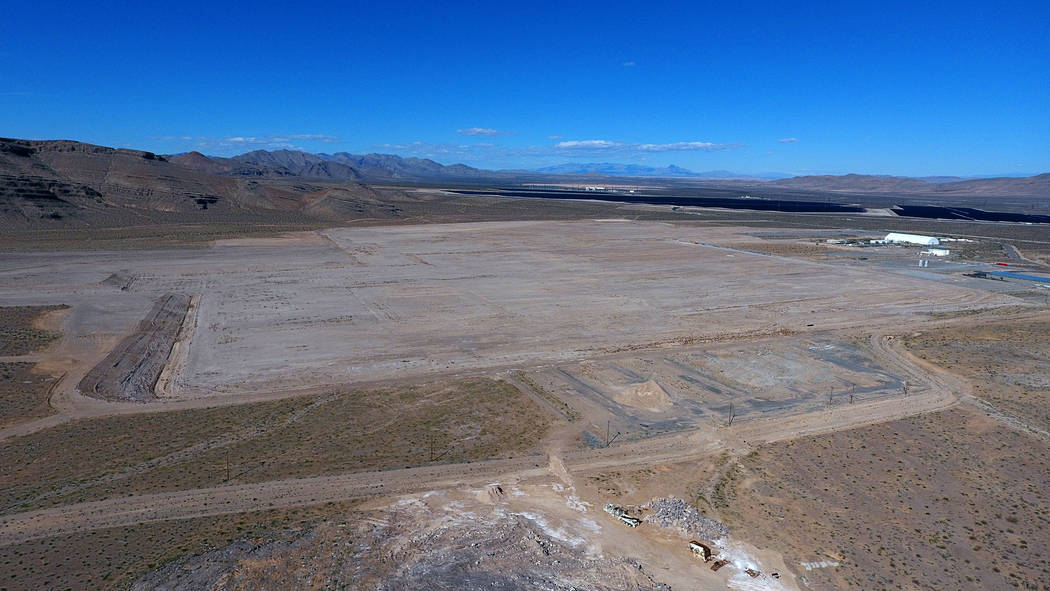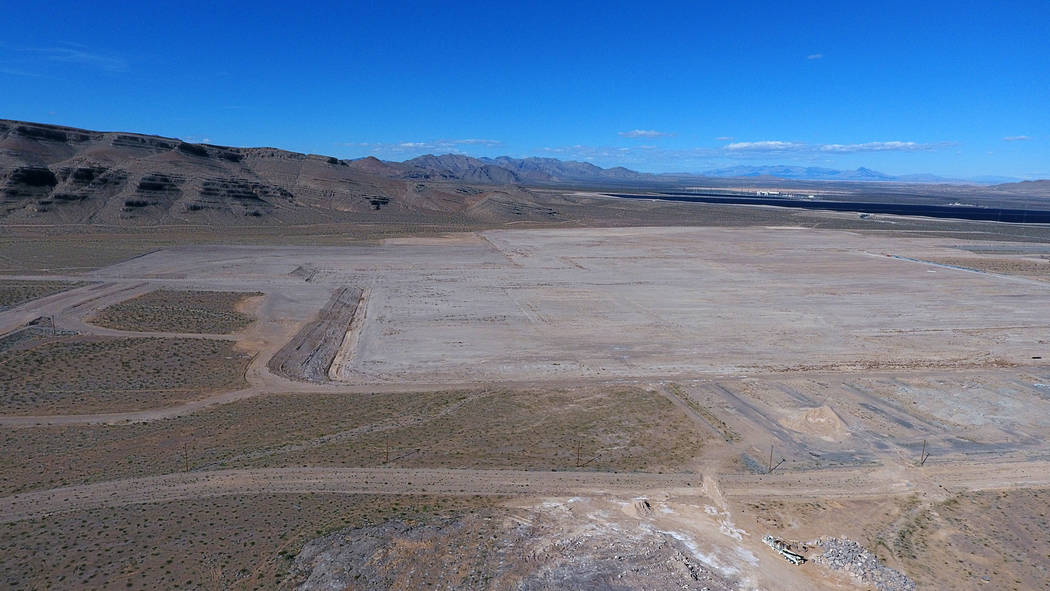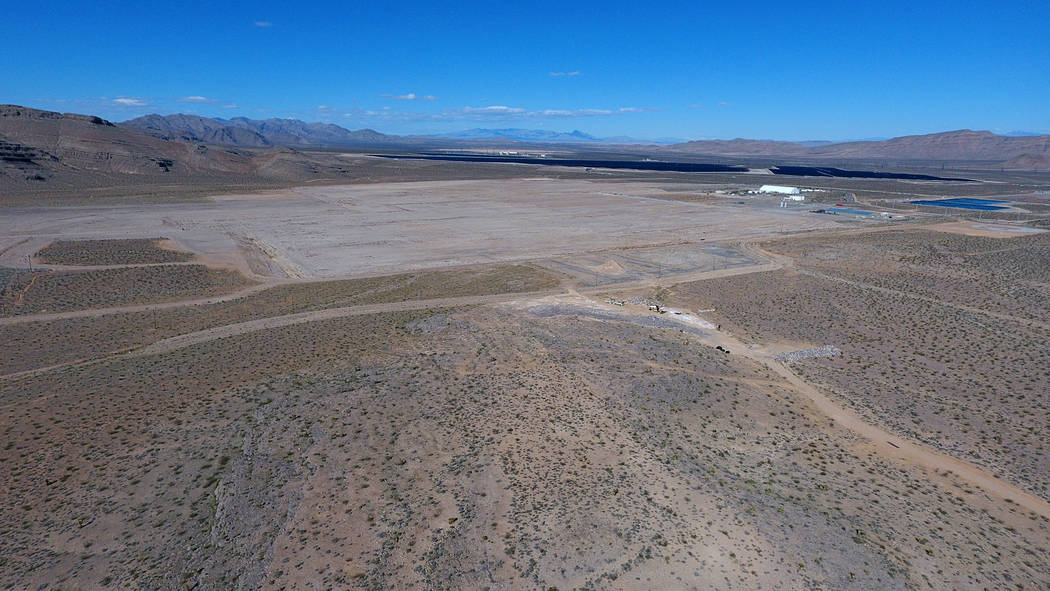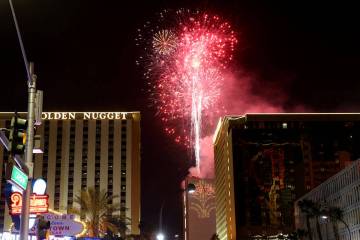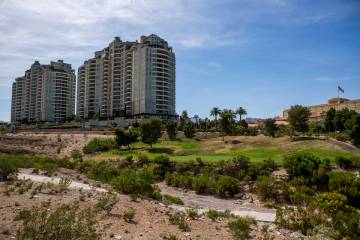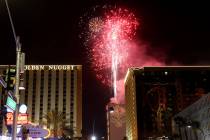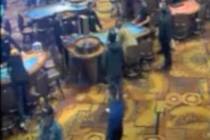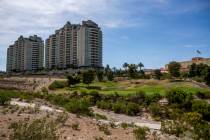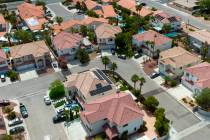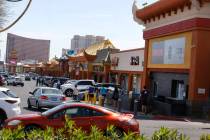Faraday Future puts $40M price tag on North Las Vegas land — VIDEO
Nearly two years after Faraday Future bailed on its North Las Vegas auto factory, the company has put its land up for sale.
Faraday is trying to sell more than 900 acres at Apex Industrial Park for $40 million, after it shifted production to a facility in Central California.
The sales effort stems from “the ongoing optimization of business strategies” at Faraday, including “global reorganization” and a reduction of its “non-core assets,” the company said in a news release late Wednesday.
Faraday’s never-built car plant was a black eye for Nevada’s economic development efforts, and the land listing comes after a deal to sell the property to a New York investment firm fell through, county records show.
Listing broker Danielle Steffen of Cushman & Wakefield said the car company is selling 913 acres, and that its “preference” is to sell the land all at once, as opposed to unloading it in pieces to various buyers.
According to Steffen, work crews graded 700 acres of the project site but didn’t build anything.
“While we are disappointed that Faraday Future’s plan for an electric car manufacturing plant in North Las Vegas never came to fruition, we are hopeful that whoever buys the 900 acres will develop the property creating long-term jobs for Nevadans,” Keith Paul, spokesman for the Nevada Governor’s Office of Economic Development, said in an email Thursday.
Why now?
John Schilling, Faraday’s director of public relations, said the startup waited nearly two years to sell because it was contemplating production strategies and eventually decided to focus on its California facility.
Sam Abuelsamid, a principal analyst for market research firm Navigant, said he was surprised the company held the land for so long amid financial troubles. Faraday said in October that it went through a “serious and unexpected cash shortfall,” and had to reduce salaries and “let go of some of our valued employees.”
Chinese real estate company Evergrande agreed in January to restructure a $2 billion investment in the startup. But according to Abuelsamid, Faraday is likely still coming up short on cash.
“Given their challenges in trying to raise more money, they’re probably getting rid of anything they can to get as much cash as they can to keep the lights on,” he said.
Schilling said the land sale should support the launch of Faraday’s flagship electric vehicle, FF 91, by the end of 2019. The company also plans to use the proceeds to continue development of the FF 81 — set to launch in mid-2020 — and bring back furloughed employees.
Clark County records show that Faraday reached a deal by late last year to sell its project site, located near the Interstate 15-U.S. Highway 93 interchange, for an undisclosed sum to Stonehill Capital Management in New York. The deal never closed.
Stonehill did not return calls seeking comment Thursday. Las Vegas attorney Greg Garman, who, records indicate, worked with Stonehill on the sale, said Thursday that “we have no comment.”
Schilling declined to comment on the deal.
Millions invested
The sale announcement comes after the city of North Las Vegas and private landowners teamed up last year to start building a 12-mile surface water pipeline to Apex, bringing needed infrastructure to an isolated industrial park that has plodded along for years with little development.
Gina Gavan, the head of North Las Vegas’ economic development department, said Faraday “invested millions of dollars” into the property.
“All a company has to do is put in its building or factory or whatever their business is,” she said. “The site is pad ready.”
In addition to the water pipeline, there’s a 750,000-gallon water tank under construction that’s set to serve the site.
The water line currently has 7,700 feet of pipe in the ground, and is set to complete its first phase by February 2021.
“All the utilities are out there,” Gavan said.
Big incentives to big flop
The Nevada Legislature convened a special session in December 2015 and approved a $335 million incentive package for Faraday. At the time, the company’s ownership was largely shrouded in secrecy, it didn’t have a publicly identified CEO and it hadn’t started selling cars.
Faraday had planned to build a 3.4 million-square-foot factory in Apex that would produce up to 150,000 electric vehicles annually, according to state records. It broke ground on the plant in 2016, but construction stalled and the company bailed on the project in July 2017.
That month, it cut a $16,000 check to Nevada’s Department of Taxation to pay back the only abatements it had received.
The next month, Faraday reportedly leased a 1 million-square-foot former tire plant in Hanford, California.
Overall, analyst Abuelsamid said, Faraday’s time in Southern Nevada was a learning opportunity for the state.
“You have to be very careful before you give that kind of level of tax abatements to unknown companies that have no experience in the business they’re breaking into,” he said.
Contact Eli Segall at esegall@reviewjournal.com or 702-383-0342. Follow @eli_segall on Twitter. Contact Bailey Schulz at bschulz@reviewjournal.com or 702-383-0233. Follow @bailey_schulz on Twitter.



